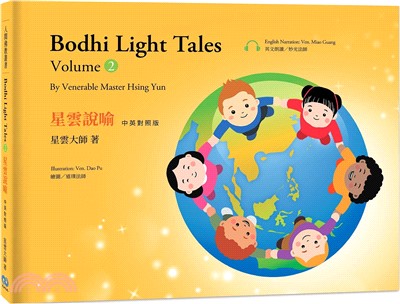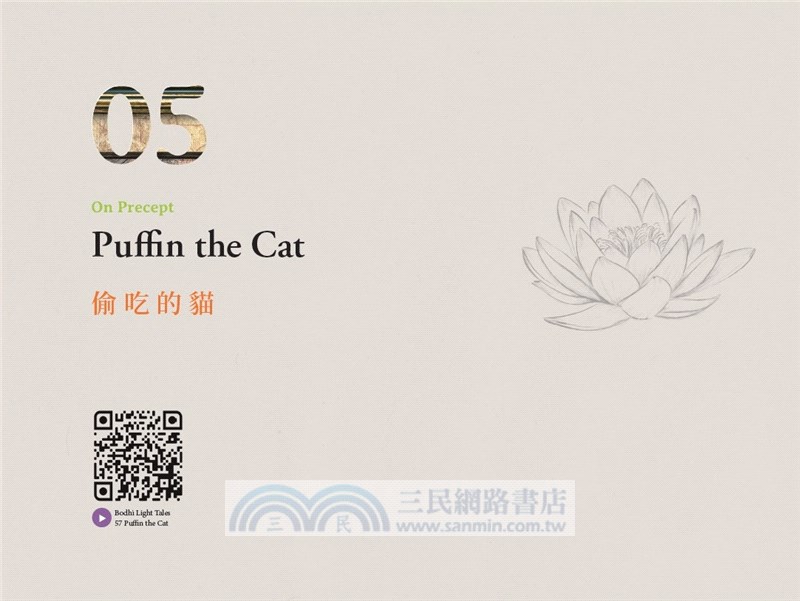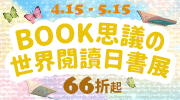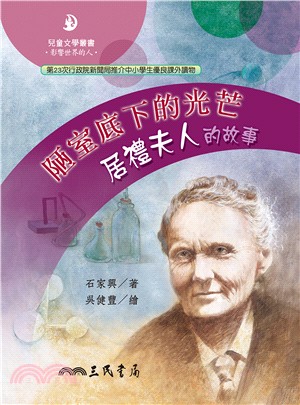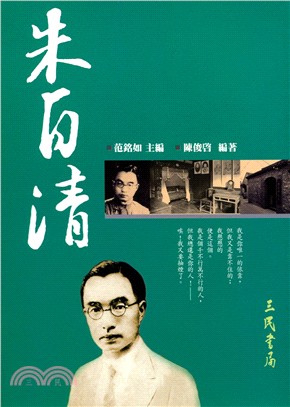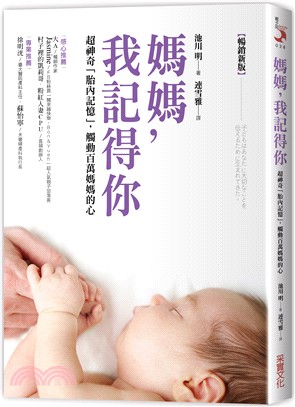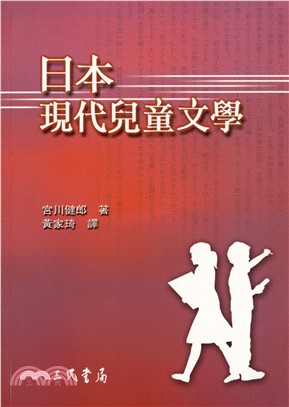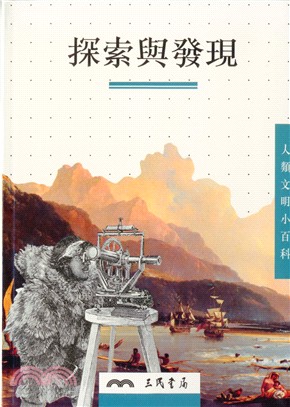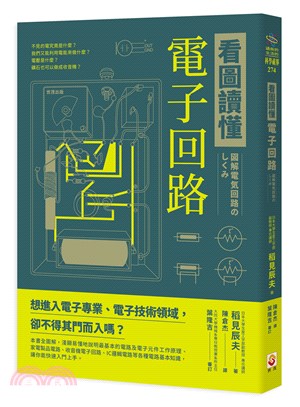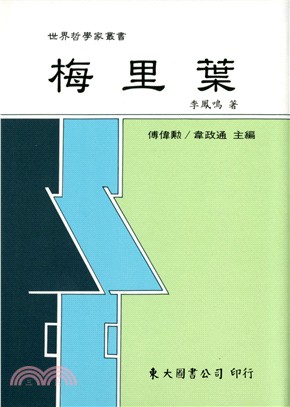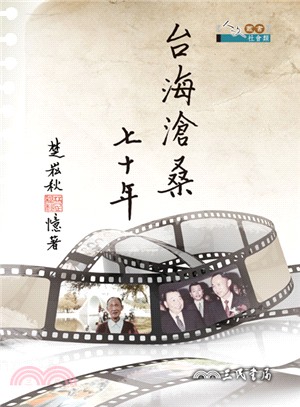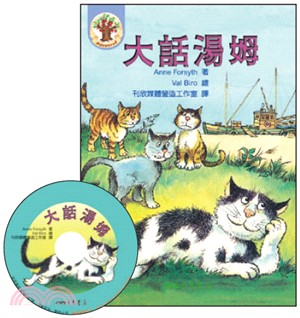相關商品
商品簡介
作者簡介
序
目次
書摘/試閱
商品簡介
★中英對照 全彩圖文 故事隨身聽 親子教育最佳教材
觸動心靈的寓言故事
小時候,故事書經常是陪伴我們長大的忠實良伴,在成長的過程中引領著我們。好的故事會觸動心靈,並且啟發我們要讓自己和周遭的世界變得更好。故事,也會形塑我們的價值觀,而我們最終成為什麼樣的人將取決於這些價值觀。
星雲大師著《星雲說喻 中英對照版》一共六冊,讓讀者透過閱讀生動有趣的故事,探索並領悟佛陀深奧的教法和人間佛教理念。故事圍繞著佛教的「六度波羅蜜」開展,也就是菩薩道的「六度」精神:布施、持戒、忍辱、精進、禪定和般若。每篇故事以一則智慧法語作為總結,引導讀者省思個中寓意。這些故事如同一面明鏡,帶著我們檢視生活,思維如何將那永恆不朽的佛法應用在生活。
第二冊收錄十五篇以六度波羅蜜中的「持戒」為主題的短篇故事。這是一套適合所有年齡層讀者的故事選集,本套書亦提供中英詞彙表,雙語讀者能更好理解每則故事的精髓。
期許《星雲說喻 中英對照版》能帶領讀者探索故事中無窮的慈悲、智慧與布施精神,照亮生命的道路。
Since our earliest days, stories have been faithful companions, guiding us through life’s journey. The power of a good story lies in its ability to touch our hearts, inspiring us to grow and bring positive change to ourselves and the world around us. Stories shape our perspective, and in turn, our perspective shapes who we become.
Introducing Bodhi Light Tales by Venerable Master Hsing Yun, a monumental 6-volume set available in both English and Chinese. This enchanting collection invites readers to explore the profound teachings of the Buddha and the principles of Humanistic Buddhism. Stories centered around the Six Paramitas, also known as the Six Perfections: Generosity, Precept, Patience, Diligence, Meditative Concentration, and Wisdom. Each tale in this collection is accompanied by words of wisdom, offering profound insights that encourage reflection upon the moral lessons conveyed. These stories provide a mirror through which we can examine our own lives and contemplate how these timeless teachings can be applied to our daily existence.
In this second volume, you will immerse yourself in the realm of Precept through a treasury of 15 short stories. Designed to captivate readers of all ages, this book also includes vocabulary lists to assist bilingual readers in fully understanding the essence of each tale.
May Bodhi Light Tales illuminate your path as you explore the boundless possibilities of compassion, understanding, and generosity.
★中英對照 全彩圖文 故事隨身聽 親子教育最佳教材
觸動心靈的寓言故事
小時候,故事書經常是陪伴我們長大的忠實良伴,在成長的過程中引領著我們。好的故事會觸動心靈,並且啟發我們要讓自己和周遭的世界變得更好。故事,也會形塑我們的價值觀,而我們最終成為什麼樣的人將取決於這些價值觀。
星雲大師著《星雲說喻 中英對照版》一共六冊,讓讀者透過閱讀生動有趣的故事,探索並領悟佛陀深奧的教法和人間佛教理念。故事圍繞著佛教的「六度波羅蜜」開展,也就是菩薩道的「六度」精神:布施、持戒、忍辱、精進、禪定和般若。每篇故事以一則智慧法語作為總結,引導讀者省思個中寓意。這些故事如同一面明鏡,帶著我們檢視生活,思維如何將那永恆不朽的佛法應用在生活。
第二冊收錄十五篇以六度波羅蜜中的「持戒」為主題的短篇故事。這是一套適合所有年齡層讀者的故事選集,本套書亦提供中英詞彙表,雙語讀者能更好理解每則故事的精髓。
期許《星雲說喻 中英對照版》能帶領讀者探索故事中無窮的慈悲、智慧與布施精神,照亮生命的道路。
Since our earliest days, stories have been faithful companions, guiding us through life’s journey. The power of a good story lies in its ability to touch our hearts, inspiring us to grow and bring positive change to ourselves and the world around us. Stories shape our perspective, and in turn, our perspective shapes who we become.
Introducing Bodhi Light Tales by Venerable Master Hsing Yun, a monumental 6-volume set available in both English and Chinese. This enchanting collection invites readers to explore the profound teachings of the Buddha and the principles of Humanistic Buddhism. Stories centered around the Six Paramitas, also known as the Six Perfections: Generosity, Precept, Patience, Diligence, Meditative Concentration, and Wisdom. Each tale in this collection is accompanied by words of wisdom, offering profound insights that encourage reflection upon the moral lessons conveyed. These stories provide a mirror through which we can examine our own lives and contemplate how these timeless teachings can be applied to our daily existence.
In this second volume, you will immerse yourself in the realm of Precept through a treasury of 15 short stories. Designed to captivate readers of all ages, this book also includes vocabulary lists to assist bilingual readers in fully understanding the essence of each tale.
May Bodhi Light Tales illuminate your path as you explore the boundless possibilities of compassion, understanding, and generosity.
★中英對照 全彩圖文 故事隨身聽 親子教育最佳教材
作者簡介
星雲大師
江蘇江都人,一九二七年生,十二歲禮志開上人為師,祖庭江蘇宜興大覺寺,傳臨濟正宗第四十八世。一九四七年於焦山佛學院畢業,期間曾參學金山、棲霞等禪淨律學諸大叢林,歷經宗下、教下、律下等完整的佛門教育。後應聘為白塔國小校長,主編《怒濤》月刊。
一九四九年春來臺,主編《人生雜誌》、《今日佛教》、《覺世》等佛教刊物。
一九六七年創建佛光山,樹立「以文化弘揚佛法,以教育培養人才,以慈善福利社會,以共修淨化人心」四大弘法宗旨,以「人間佛教」為宗風,先後在世界各地創建三百餘所道場,創辦多所美術館、圖書館、出版社、書局、人間福報、雲水醫院,興辦佛教學院十六所,中學三所,及西來、南華、佛光、南天、光明五所大學,及人間佛教研究院。
一九七O年後,相繼成立「大慈育幼院」、「仁愛之家」,收容撫育無依之幼童、老人及從事急難救濟等福利社會。一九九一年成立「國際佛光會」,被推為總會會長,實踐「佛光普照三千界,法水長流五大洲」的理想。
一九七七年編纂《佛光大藏經》、《佛光大辭典》,《中國佛教經典寶藏精選白話版》等。二O一七年出版《星雲大師全集》,共三百六十五冊,三千餘萬字,有系統地闡述人間佛教的思想、學說、理論,以及實踐結果。
二O二三年,大師住世緣盡,淨業圓滿,享耆壽九十七,被奉為佛光堂上第一代開山祖師,留遺偈:「心懷度眾慈悲願,身似法海不繫舟, 問我一生何所求,平安幸福照五洲」。
Biography of Venerable Master Hsing Yun
Venerable Master Hsing Yun was born in 1927 in Jiangdu, Jiangsu Province, China. At the age of 12, he was tonsured by Venerable Master Zhikai in Qixia Temple, Nanjing, with Dajue Temple in Yixing, Jiangsu, as his ancestral temple. He later became the 48th-generation lineage holder of the Linji Chan school. In 1947, he graduated from Jiaoshan Buddhist College, and also trained at various Chan, Pure Land, and Vinaya monasteries, including Jinshan, Qixia, and others. He received a comprehensive Buddhist education in the lineage, teachings, and Vinaya disciplines. Later on, the Venerable Master was invited to serve as the principal of Baita Elementary School, and also the editor-in-chief of Raging Billows Monthly.
In the spring of 1949, the Venerable Master arrived in Taiwan. He served as the editor-in-chief of Human Life Magazine, Buddhism Today Magazine, and Awakening the World.
In 1967, the Venerable Master founded the Fo Guang Shan Buddhist Order, with the Four Objectives: to propagate the Dharma through culture; to foster talents through education; to benefit society through charity, and to purify people’s minds through spiritual cultivation. Guided by the principles of Humanistic Buddhism, he went on to establish over three hundred temples worldwide. Additionally, he oversaw the creation of various art galleries, libraries, publishing companies, bookstores, the Merit Times newspaper, and the Cloud and Water Mobile Clinic. Furthermore, he established sixteen Buddhist colleges and founded three high schools and five universities, including the University of the West in the United States, Fo Guang University in Taiwan, Nanhua University in Taiwan, Nan Tien Institute in Australia, and Guang Ming College in the Philippines. Notably, he also established the Institute of Humanistic Buddhism.
In 1970, the Venerable Master established Da Ci Children’s Home and the Lanyang Ren Ai Senior Citizen’s Home, providing shelter and care for vulnerable young children, and elderly individuals. He also actively engaged in emergency relief efforts, contributing to the fostering of a welfare society. Then, in 1991, he founded the Buddha’s Light International Association (BLIA) and was elected as the President of the World Headquarters. Under his guidance, the association’s mission expanded, symbolized by the saying, “the Buddha’s Light shining over three thousand realms, and the Dharma water flowing continuously through the five continents.”
In 1977, the Fo Guang Buddhist Canon, the Fo Guang Dictionary of Buddhism, and the 132-volume Selected Chinese Buddhist Texts in Modern Language were compiled. In 2017, the Complete Works of Venerable Master Hsing Yun was published, comprising 365 volumes with over 30 million words. In 2023, it was supplemented to 395 volumes, exceeding 40 million words, systematically expounding the ideologies, teachings, theories, and practical outcomes of Humanistic Buddhism.
In 2023, the Venerable Master peacefully passed away, his virtuous deeds complete and fulfilled, having reached the age of ninety-seven. He was revered as the Founding Master of the Fo Guang Order, and he left behind this poignant poem:
A mind with the compassionate vow to deliver sentient beings,
A body like a boat on the Dharma ocean, unbound.
Should you ask what I have achieved in this lifetime?
Peace and happiness shine upon the five continents.
江蘇江都人,一九二七年生,十二歲禮志開上人為師,祖庭江蘇宜興大覺寺,傳臨濟正宗第四十八世。一九四七年於焦山佛學院畢業,期間曾參學金山、棲霞等禪淨律學諸大叢林,歷經宗下、教下、律下等完整的佛門教育。後應聘為白塔國小校長,主編《怒濤》月刊。
一九四九年春來臺,主編《人生雜誌》、《今日佛教》、《覺世》等佛教刊物。
一九六七年創建佛光山,樹立「以文化弘揚佛法,以教育培養人才,以慈善福利社會,以共修淨化人心」四大弘法宗旨,以「人間佛教」為宗風,先後在世界各地創建三百餘所道場,創辦多所美術館、圖書館、出版社、書局、人間福報、雲水醫院,興辦佛教學院十六所,中學三所,及西來、南華、佛光、南天、光明五所大學,及人間佛教研究院。
一九七O年後,相繼成立「大慈育幼院」、「仁愛之家」,收容撫育無依之幼童、老人及從事急難救濟等福利社會。一九九一年成立「國際佛光會」,被推為總會會長,實踐「佛光普照三千界,法水長流五大洲」的理想。
一九七七年編纂《佛光大藏經》、《佛光大辭典》,《中國佛教經典寶藏精選白話版》等。二O一七年出版《星雲大師全集》,共三百六十五冊,三千餘萬字,有系統地闡述人間佛教的思想、學說、理論,以及實踐結果。
二O二三年,大師住世緣盡,淨業圓滿,享耆壽九十七,被奉為佛光堂上第一代開山祖師,留遺偈:「心懷度眾慈悲願,身似法海不繫舟, 問我一生何所求,平安幸福照五洲」。
Biography of Venerable Master Hsing Yun
Venerable Master Hsing Yun was born in 1927 in Jiangdu, Jiangsu Province, China. At the age of 12, he was tonsured by Venerable Master Zhikai in Qixia Temple, Nanjing, with Dajue Temple in Yixing, Jiangsu, as his ancestral temple. He later became the 48th-generation lineage holder of the Linji Chan school. In 1947, he graduated from Jiaoshan Buddhist College, and also trained at various Chan, Pure Land, and Vinaya monasteries, including Jinshan, Qixia, and others. He received a comprehensive Buddhist education in the lineage, teachings, and Vinaya disciplines. Later on, the Venerable Master was invited to serve as the principal of Baita Elementary School, and also the editor-in-chief of Raging Billows Monthly.
In the spring of 1949, the Venerable Master arrived in Taiwan. He served as the editor-in-chief of Human Life Magazine, Buddhism Today Magazine, and Awakening the World.
In 1967, the Venerable Master founded the Fo Guang Shan Buddhist Order, with the Four Objectives: to propagate the Dharma through culture; to foster talents through education; to benefit society through charity, and to purify people’s minds through spiritual cultivation. Guided by the principles of Humanistic Buddhism, he went on to establish over three hundred temples worldwide. Additionally, he oversaw the creation of various art galleries, libraries, publishing companies, bookstores, the Merit Times newspaper, and the Cloud and Water Mobile Clinic. Furthermore, he established sixteen Buddhist colleges and founded three high schools and five universities, including the University of the West in the United States, Fo Guang University in Taiwan, Nanhua University in Taiwan, Nan Tien Institute in Australia, and Guang Ming College in the Philippines. Notably, he also established the Institute of Humanistic Buddhism.
In 1970, the Venerable Master established Da Ci Children’s Home and the Lanyang Ren Ai Senior Citizen’s Home, providing shelter and care for vulnerable young children, and elderly individuals. He also actively engaged in emergency relief efforts, contributing to the fostering of a welfare society. Then, in 1991, he founded the Buddha’s Light International Association (BLIA) and was elected as the President of the World Headquarters. Under his guidance, the association’s mission expanded, symbolized by the saying, “the Buddha’s Light shining over three thousand realms, and the Dharma water flowing continuously through the five continents.”
In 1977, the Fo Guang Buddhist Canon, the Fo Guang Dictionary of Buddhism, and the 132-volume Selected Chinese Buddhist Texts in Modern Language were compiled. In 2017, the Complete Works of Venerable Master Hsing Yun was published, comprising 365 volumes with over 30 million words. In 2023, it was supplemented to 395 volumes, exceeding 40 million words, systematically expounding the ideologies, teachings, theories, and practical outcomes of Humanistic Buddhism.
In 2023, the Venerable Master peacefully passed away, his virtuous deeds complete and fulfilled, having reached the age of ninety-seven. He was revered as the Founding Master of the Fo Guang Order, and he left behind this poignant poem:
A mind with the compassionate vow to deliver sentient beings,
A body like a boat on the Dharma ocean, unbound.
Should you ask what I have achieved in this lifetime?
Peace and happiness shine upon the five continents.
序
《星雲說喻 中英對照版》,是一套引人入勝的六冊選集,收編了九十五篇由敬愛的星雲大師講說,以六度波羅蜜為主題的故事。這些故事最初收錄在《星雲說喻》,大師喜歡在演講中穿插生動有趣的故事,以傳遞人間佛教思想與實踐的精髓。
2019年,我們首次將《星雲說喻》的內容翻譯成有聲故事書,並於 Anchor 播客平台推出「菩提心燈」系列故事 (Bodhi Light Tales Podcast)。這些年,我們一直期待著將這些故事結集成冊,如今因緣條件具足,並以中英雙語圖書的形式呈現。為了讓來自各年齡層、宗教、信仰,以及文化的讀者皆能與故事產生共鳴,我們在精簡扼要的原文基礎上發揮想像, 增添了一些原文故事沒有的情節。也就是說,這套故事書中的英文故事是經過編譯的創作,非中文的直譯對照。編譯的幾項原則要點說明如下:
首先是對故事人物的背景資訊加以補充,如:名字、所從事行業,及個性等。我們蒐集文獻和查證史料,以確保人物的歷史背景正確無誤。希望藉由建構鮮明的人物特性,能帶給讀者更多親和力,也鼓勵讀者進一步探索喜愛的角色。
第二,根據語言差異做調整。舉例來說,其中一則故事為了彰顯信息誤導的可怕,而使用了相同字尾的構詞手法。在中文的情節裡, 最初說的是一架飛機,隨後被傳成了十一架飛機,到最後演變成了九十一架飛機。而在英文版本中,我們將數字修改為九(nine) 架飛機、十九(nineteen)架飛機、九十(ninety)架飛機,以保留與中文相同的特色和效果,讓英語讀者能夠充分地理解故事的含意。
第三,提綱挈領出每篇故事的主旨和寓意,讓讀者更容易把握住故事所要傳達的信息,引導省思。同時,也探討人們在現當代可能面臨的挑戰,幫助讀者連結所學,實際應用在日常生活之中。
故事結束,為每篇故事搭配一則精選「星雲法語」,作為總結故事核心寓意的智慧錦囊。「星雲法語」原是大師依據自己的人生經歷寫下的鼓勵和箴言,期望藉此帶給大家正念,在人生迷茫處作一盞指引方向的明燈。
學佛與否,佛性本自具足。無論是兒童還是成人,我們都有能力讓自己和周遭的世界變得更好、更正向。希望這套故事書能啟迪心性,讓各個年齡層的讀者在邁向自我覺醒的生命旅程中,充滿能量、勇氣和慈悲。
Bodhi Light Tales is a captivating 6-volume collection of stories focused on the Six Paramitas, narrated by the revered Venerable Master Hsing Yun. Originally published in Chinese as Xingyun shuoyu (星雲說喻), these Buddhist Tales by Venerable Master Hsing Yun emerged from his enlightening talks and lectures on Humanistic Buddhism. In 2019, we took the initiative to adapt these stories into English as an ongoing audiobook series for the Bodhi Light Tales Anchor Podcast channel. However, our ultimate vision has always been to present them in a book format. As the original stories were concise and lacked additional details, the English adaptations were intentionally modified from the Chinese. In essence, the English tales are not direct translations of their original Chinese counterparts. To ensure that readers of all ages, faiths, beliefs, and cultures can connect with these stories, we employed several key approaches during the transition from Chinese to English, which we will elaborate on below.
To make the main characters more relatable, we added background information such as their names, occupations, and personalities. Thorough research was conducted to maintain historical and factual accuracy. We hope this additional information will help readers delve deeper into their favorite characters and even encourage further exploration.
Additionally, we made certain adaptations to accommodate language differences. For instance, in one of the stories, one single plane mentioned at first transformed into eleven planes, and in the end, ninety-one planes. In the English version, we changed it to nine planes as mentioned initially, later becoming nineteen planes, and finally, ninety planes. These modifications were implemented to preserve the example of homophones originally featured, ensuring comprehension for English readers.
Each tale concludes with a summary of its morals, providing readers with a clear understanding of the story’s meaning and key lessons. These summaries highlight challenges people face in today’s world and offer practical applications for daily life.
Additionally, we included Dharma Words from Venerable Master Hsing Yun at the end of each story, offering readers a final nugget of wisdom to take away. These quotes were carefully selected based on their relevance to the moral of each story. Venerable Master Hsing Yun originally shared these words of encouragement and advice based on his life experiences, aiming to inspire mindfulness and guide individuals in times of uncertainty.
Remember, Buddha-nature resides within all of us, regardless of whether we practice Buddhism or not. Both children and adults have the power to better themselves and positively impact the world around them. Our sincere hope is that these stories will inspire people of all ages, instilling in them a sense of inspiration, courage, and compassion. May this collection serve as a source of inspiration as you navigate through life’s journey toward self-awakening!
2019年,我們首次將《星雲說喻》的內容翻譯成有聲故事書,並於 Anchor 播客平台推出「菩提心燈」系列故事 (Bodhi Light Tales Podcast)。這些年,我們一直期待著將這些故事結集成冊,如今因緣條件具足,並以中英雙語圖書的形式呈現。為了讓來自各年齡層、宗教、信仰,以及文化的讀者皆能與故事產生共鳴,我們在精簡扼要的原文基礎上發揮想像, 增添了一些原文故事沒有的情節。也就是說,這套故事書中的英文故事是經過編譯的創作,非中文的直譯對照。編譯的幾項原則要點說明如下:
首先是對故事人物的背景資訊加以補充,如:名字、所從事行業,及個性等。我們蒐集文獻和查證史料,以確保人物的歷史背景正確無誤。希望藉由建構鮮明的人物特性,能帶給讀者更多親和力,也鼓勵讀者進一步探索喜愛的角色。
第二,根據語言差異做調整。舉例來說,其中一則故事為了彰顯信息誤導的可怕,而使用了相同字尾的構詞手法。在中文的情節裡, 最初說的是一架飛機,隨後被傳成了十一架飛機,到最後演變成了九十一架飛機。而在英文版本中,我們將數字修改為九(nine) 架飛機、十九(nineteen)架飛機、九十(ninety)架飛機,以保留與中文相同的特色和效果,讓英語讀者能夠充分地理解故事的含意。
第三,提綱挈領出每篇故事的主旨和寓意,讓讀者更容易把握住故事所要傳達的信息,引導省思。同時,也探討人們在現當代可能面臨的挑戰,幫助讀者連結所學,實際應用在日常生活之中。
故事結束,為每篇故事搭配一則精選「星雲法語」,作為總結故事核心寓意的智慧錦囊。「星雲法語」原是大師依據自己的人生經歷寫下的鼓勵和箴言,期望藉此帶給大家正念,在人生迷茫處作一盞指引方向的明燈。
學佛與否,佛性本自具足。無論是兒童還是成人,我們都有能力讓自己和周遭的世界變得更好、更正向。希望這套故事書能啟迪心性,讓各個年齡層的讀者在邁向自我覺醒的生命旅程中,充滿能量、勇氣和慈悲。
Bodhi Light Tales is a captivating 6-volume collection of stories focused on the Six Paramitas, narrated by the revered Venerable Master Hsing Yun. Originally published in Chinese as Xingyun shuoyu (星雲說喻), these Buddhist Tales by Venerable Master Hsing Yun emerged from his enlightening talks and lectures on Humanistic Buddhism. In 2019, we took the initiative to adapt these stories into English as an ongoing audiobook series for the Bodhi Light Tales Anchor Podcast channel. However, our ultimate vision has always been to present them in a book format. As the original stories were concise and lacked additional details, the English adaptations were intentionally modified from the Chinese. In essence, the English tales are not direct translations of their original Chinese counterparts. To ensure that readers of all ages, faiths, beliefs, and cultures can connect with these stories, we employed several key approaches during the transition from Chinese to English, which we will elaborate on below.
To make the main characters more relatable, we added background information such as their names, occupations, and personalities. Thorough research was conducted to maintain historical and factual accuracy. We hope this additional information will help readers delve deeper into their favorite characters and even encourage further exploration.
Additionally, we made certain adaptations to accommodate language differences. For instance, in one of the stories, one single plane mentioned at first transformed into eleven planes, and in the end, ninety-one planes. In the English version, we changed it to nine planes as mentioned initially, later becoming nineteen planes, and finally, ninety planes. These modifications were implemented to preserve the example of homophones originally featured, ensuring comprehension for English readers.
Each tale concludes with a summary of its morals, providing readers with a clear understanding of the story’s meaning and key lessons. These summaries highlight challenges people face in today’s world and offer practical applications for daily life.
Additionally, we included Dharma Words from Venerable Master Hsing Yun at the end of each story, offering readers a final nugget of wisdom to take away. These quotes were carefully selected based on their relevance to the moral of each story. Venerable Master Hsing Yun originally shared these words of encouragement and advice based on his life experiences, aiming to inspire mindfulness and guide individuals in times of uncertainty.
Remember, Buddha-nature resides within all of us, regardless of whether we practice Buddhism or not. Both children and adults have the power to better themselves and positively impact the world around them. Our sincere hope is that these stories will inspire people of all ages, instilling in them a sense of inspiration, courage, and compassion. May this collection serve as a source of inspiration as you navigate through life’s journey toward self-awakening!
目次
Bodhi Light Tales:Volume 2
Biography of Venerable Master Hsing Yun 星雲大師簡介
Editor’s Introduction 編者序
How to Use This Book 如何使用本書
Stories
01. Keep It Secret 不可告訴別人
02. Dirty Basin 洗腳的木盆
03. Follow the Rules 遊戲規則
04. Mind Your Own Business 誰之過?
05. Puffin the Cat 偷吃的貓
06. Choices for Life 犯戒救人
07. Filthy 誰比較髒?
08. No Lies 不說假話
09. Discipline 受杖自責
10. Two Wives 一妻一妾
11. Sandalwood 賣檀香
12. Candy Craving 老人抓糖
13. The Human-Faced Ulcer 人面瘡的故事
14. A Lie Becomes A Truth 謊言變真理
15. This Little Piggy 十一頭小豬
Biography of Venerable Master Hsing Yun 星雲大師簡介
Editor’s Introduction 編者序
How to Use This Book 如何使用本書
Stories
01. Keep It Secret 不可告訴別人
02. Dirty Basin 洗腳的木盆
03. Follow the Rules 遊戲規則
04. Mind Your Own Business 誰之過?
05. Puffin the Cat 偷吃的貓
06. Choices for Life 犯戒救人
07. Filthy 誰比較髒?
08. No Lies 不說假話
09. Discipline 受杖自責
10. Two Wives 一妻一妾
11. Sandalwood 賣檀香
12. Candy Craving 老人抓糖
13. The Human-Faced Ulcer 人面瘡的故事
14. A Lie Becomes A Truth 謊言變真理
15. This Little Piggy 十一頭小豬
書摘/試閱
Follow the Rules 遊戲規則
有一戶人家,父母親準備帶領小兒小女到海邊戲水。出發前一天晚上,父親召集大家講說隔天要到海邊遊玩的注意事項,以及工作分配。只見兒子嘟著嘴說: 「爸爸,好討厭!一天到晚訂什麼規則,連到海邊玩水,也要來這一套!」女兒也表示抗議:「爸爸,輕鬆一點嘛!老是要分配我們做什麼事,好不容易有這麼一個假日,何必弄得那麼嚴肅呢?」最後,這場家庭會議就在不歡喜的氣氛中草草結束。
第二天,一家人來到海邊。望著沙灘的美好,海水的平靜, 不少人在那裡游泳,兒子也想跟著他們一起下水游泳,但是翻遍了行李箱,卻怎麼也找不到泳衣, 不禁抱怨起來:「爸爸,您怎麼沒有交代我們要帶泳衣出門呢?害得我們不能盡情地玩水。」
這時候,爸爸就說了:「兒子呀!昨天晚上的會議,原本就是要和大家商量這些事的,但是你們都不要我訂注意事項,不願意我分配工作,當然今天出門也就沒有人想起要帶泳衣了。」由於不講究分工,不重視規則,最後事情落得不能圓滿,大家也沒有玩興,提早就結束行程,回到了家裡。
回到家中不久,吃飯時間一到,兒女們紛紛來到飯桌前,只是奇怪地,飯桌上竟然空無一物,於是他們就問:「媽媽,我們的飯菜呢?」這時候,媽媽說:「沒有規定飯菜一定要由媽媽煮呀!你們自己想辦法吧!」這回,兒女們終於明白父母平日訂定規則的苦心。
一般人都不喜歡規則, 覺得受到約束,但是在這個世間上,所謂「不依規矩, 不能成方圓」,在眾人集合的社會裡,就是需要有這麼一個約定俗成的法則,大家分工合作、合作分工,才有秩序。所以,現代的年輕人,所謂「新新人類」,有些人標新立異,高喊著爭取自由,不要規則。事實上,如果自由漫無目的,那是很危險的,就像一部沒有煞車裝備的車,當你享受著飆車的快感時,也處處潛藏著危機。
因此,我們的社會、我們的家園、我們的人生, 還是要有一個規則,大家共同遵循,才能幸福快樂。
Once upon a time, there was a young family with both children in elementary school. Due to their busy work schedules1, the parents were unable to take their children out for short trips. However, as the children had been begging2 about going to the beach, the parents finally decided to take them out there.
The night before, the dad gathered everyone in the living room and announced3, “Seeing as you both have been very well-behaved4, mom and I have decided to take you to the beach! But before we leave tomorrow, we need to have a quick meeting, so you both can keep a few things in mind.”
Slightly frustrated5, the son, Daniel, began yelling, “Dad…why?! I thought we’re going to the beach for fun! Why do you always have to set rules on us?! This is pointless, we just want to have fun and play around!”
The daughter Rosie, also shouted, “Yeah dad! Stop being so serious! We’re finally going on holiday, can’t we just enjoy ourselves?!”
Listening to his children, the dad was extremely disappointed and the meeting ended abruptly6, leaving everyone gloomy7 for the remainder of the evening.
The next day, as the family arrived at the beach, they were drawn to the beautiful sights of the golden sand and the calmness of the deep blue sea. Many people were in the water, splashing8 each other and letting the waves wash over them. Others were building sandcastles or surfing. Seeing how much fun everyone was having, Daniel was eager9 to get into the water. He began opening the bags they had brought with them. After searching for a while, he could not find his swimsuit. Frustrated, he complained to his dad and said, “Where is my swimsuit?”
His dad shrugged10 and replied, “I don’t know.”
Daniel whined, “Why didn’t you remind us to bring our swimsuits? Going to the beach is pointless if we can’t swim!”
His dad said, “Son, last night I gathered11 you all to discuss what we needed to prepare and bring for our trip. But, you didn’t want to listen, thinking that it would mean more responsibility12 and rules for you. So in the end, of course, no one remembered to pack swimsuits.”
Listening in, the mum added, “This is what happens when you don’t listen to your dad and Me. In the end, you are the ones that suffer the consequences13.”
As the children could not see the importance of following rules and obeying14 their parents, the family had a disappointing time at the beach. As a result, they ended their trip early and returned home.
Soon after returning home, it was almost dinner time. Daniel and Rosie came to the dining table. However, to their surprise15, nothing was prepared. They asked, “Mom, where is our dinner?” Their mother replied, “There is no rule that says I have to cook every meal for you! You can both find a way to feed yourselves.”
At that moment, Daniel and Rosie finally realized why their parents had always set rules for the family.
This story highlights that many of us do not like rules, as we feel constrained16 by them. There is a Chinese saying, “Without following rules, not even a square or a circle is possible.” This means that there needs to be a set of rules or standards, otherwise, we cannot make a square or circle.
In this world, we exist and live in a society surrounded by people. Whether it be in public spaces, workplaces, or even social gatherings, we need certain conventional rules in order for everyone to work and live together cohesively17. Working in an orderly manner requires delegation18 and cooperation in order to achieve common goals. However, young people today strive to be innovative19 and different, quite often calling out for freedom without rules. They perceive these rules as confinement20, thinking it dictates21 the way they should live and work. In reality, if our freedom is aimless and without boundaries22, it can be very dangerous. Just like driving a car without brakes. As you enjoy the feeling of the speeding car, at the same time, disaster could strike any moment when you lose control of your vehicle.
Therefore, there need to be rules for everyone to follow within society, our homes, and in life, so that we can live in harmony and happiness.
In Buddhism, we are encouraged23 to observe the Five Precepts, which are to refrain from killing, stealing, sexual misconduct, lying, and intoxicants. Many people think that upholding these Five Precepts, it is like imposing24 restrictions25on themselves. However, the purpose of these Precepts is to help guard26 our actions, so that we do not cause harm to others and ourselves. As a result, we can enjoy true freedom from the joys of living in peace and harmony with one another.
VOCABULARY
1. schedules (n.) 日程表
2. begging (v.) 請求;懇求
3. announced (v.) 宣布
4. well-behaved (adj.) 行為端正的
5. frustrated (adj.) 沮喪的
6. abruptly (adv.) 突然地
7. gloomy (adj.) 憂悶的
8. splashing (v.) 潑
9. eager (adj.) 渴望的
10. shrugged (v.) 聳肩
11. gathered (v.) 集合
12. responsibility (n.) 責任
13. consequences (n.) 後果
14. obeying (v.) 遵從;順從
15. surprise (n.) 驚訝
16. constrained (adj.) 受約束的
17. cohesively (adv.) 凝聚力地
18. delegation (n.) 委派
19. innovative (adj.) 創新的
20. confinement (n.) 禁閉;監禁
21. dictates (v.) 命令;規定
22. boundaries (n.) 界線
23. encouraged (v.) 鼓勵
24. imposing (v.) 強制實行;把……強加於
25. restrictions (n.) 限制
26. guard (v.) 保護;看守
星雲大師法語
Dharma Words by Venerable Master Hsing Yun
守持戒法如瓔珞,可以莊嚴身心。
守持戒法如明燈,可以照破痴暗。
守持戒法如甘霖,可以解除乾旱。
守持戒法如城池,可以抵擋魔外。
Precepts are the jewels that adorn the body and mind.
Precepts are light breaking through the darkness.
Precepts are the rain after a drought.
Precepts are a moated castle holding off the enemy.
人面瘡的故事 The Human-Faced Ulcer
人的身體有很多疾病,其中有一種瘡疾,叫做「人面瘡」,是長在人的膝蓋上,形相如人一般,五官齊全,還有一張口,每天也要吃飯。這則「人面瘡」的故事,是發生在唐朝知玄悟達國師的身上。
唐朝的知玄禪師有一次外出雲遊參學,半路遇到一位同道。這位同道的身上長了瘡,並且發出惡臭, 沒有人敢和他往來。知玄禪師心生憐憫,便主動給予照料,直到他身體康復為止。同道心中非常感謝,就對禪師說:「將來如果你有什麼苦難,可以到四川彭州九隴山來找我。只要看到二棵大松樹並連在一起,就是我居住的地方了。」其實,這位同道是個阿羅漢,名叫迦諾迦尊者。
後來,知玄禪師因為道高德重,受到唐懿宗的恭敬,禮拜為師,並且敕封為「悟達國師」。坐上了皇帝賜予的檀香寶座,悟達國師可說備受禮遇,不知不覺就生起了虛榮心。不久,他發現膝上害了人面瘡。國師深知這必定是因為自己的得失心,而招感業障現前,他想起過去那位同道臨別的叮囑,於是忍著痛苦,來到四川彭州九隴山。
在同道的招呼下,悟達國師先是住了一宿。隔天,在一位童子帶領下,來到一處泉水邊。身上發熱、痛苦難耐的國師,掬起水來就要清洗人面瘡,但是瞬間,人面瘡竟然開口說話了,他說:「悟達國師,暫且不要清洗!我要告訴你,你我在西漢時代結下了冤仇, 那時候你是袁盎,我是晁錯,因被你誣陷,招來殺身之禍,久已想要報仇雪恨。但由於十世以來,你都是一名高僧,所以我始終沒有辦法靠近你。到了這一世,因為你受到皇帝的恩寵,起了虛榮心,於福德有損,我才得以乘虛而入。今日承蒙迦諾迦尊者出面為你我解除冤業,賜給我三昧法水,令我得到清涼解脫,我們之間的宿怨,從此就一筆勾銷了。」
悟達國師聽了不覺心驚,連忙以清水洗淨人面瘡,痛徹肝腸,立刻讓他昏厥了過去。奇妙的是,等到他甦醒過來,人面瘡也消失了。
由此因緣,後來悟達國師作了《慈悲三昧水懺》,敘說懺悔認錯可以消災免難。
從這一則故事中,我們可以知道懺悔的重要。衣服髒了,用水洗一洗就會乾淨;身體髒了,用水洗一洗,就會清潔;一個人縱然有一些罪業,只要誠心懺悔、肯得改過,懺悔的法水就能滅罪消愆。
Human bodies can develop many different diseases such as ulcers1 and sores2. Once upon a time, there was a story about a particular kind of ulcer which had a human face, complete with eyes, nose, and a mouth that meant this ulcer also needed to be fed. This story of the Human-faced Ulcer is said to have happened to Chan Master Zhi Xuan, who later on in the Tang dynasty became the renowned National Master Wu Da.
Once upon a time, Master Zhi Xuan was on a study trip. On his journey, he met another monastic who had ulcers all over his body and smelled3 so bad nobody wanted to be near him. Master Zhi Xuan felt sorry for the monastic and decided to care for him until he recovered4. When the monastic had recovered, he said to Master Zhi Xuan, “Thank you so much for taking care of me. If you ever find yourself in any trouble5, please come look for me at Jiulong Mountain in Sichuan. When you can see the twin pine trees, you will have arrived at my place.”
“All right, I will keep that in mind. Thank you,” replied Master Zhi Xuan.
Actually, without realizing it, Master Zhi Xuan had just helped an enlightened being named Kanaka.
Years later, Master Zhi Xuan’s virtuous6 conduct won him the praise and respect of Emperor Yizong. He was given the honorable title of “National Master Wu Da,” meaning “the thoroughly enlightened one.” Furthermore, the Emperor granted him a precious throne made of sandalwood. After receiving this throne, National Master Wu Da unknowingly gave rise to thoughts of arrogance7 and vanity8. Over time, a huge ulcer began to grow on one of his knees, with all the features of a human face. This “Human-faced Ulcer” caused the National Master unbearable9 pain. However, he did not cry out or complain, as he knew deep down that this resulted from his karmic retribution10.
One day, as the pain became extremely11 unbearable, he suddenly remembered what Kanaka had said to him years ago. So, he decided to seek12 help and headed to Jiulong Mountain.
When the National Master arrived at Kanaka’s place, it was already evening, and so he was offered a place to stay for the night. The next day, Kanaka’s attendant13 came to him, “Good morning National Master Wu Da, I hope you slept well.”
“Yes, I did. Thank you,” replied the National Master.
“Master Kanaka has asked me to take you to the spring14 where you can wash the ulcer on your knee,” the attendant said.
“Yes. Thank you so much.”
After arriving at the spring, feeling hot and in excruciating15 pain, the National Master sat down next to the water. He then began to wash his knee. Suddenly, the ulcer began to speak to him, “National Master Wu Da, please stop. I must tell you something.”
In disbelief16, the National Master stopped and mumbled17, “Are you talking to me?”
“Yes,” the ulcer replied.
The National Master kept silent and looked at his knee.
The ulcer continued, “Do you know that we have met before? It was during the West Han dynasty. At that time, you were called Yuan Ang and I was Chao Cuo. But back then, you wronged me. You framed18 me and the Emperor gave the order to have me killed. I suffered a horrific19 death and I swore I would get revenge20. However, in your other past lives, you had always been a most honorable and virtuous monastic, always strict in observing the precepts. Therefore, I was unable to do anything to harm you. But in your present life, upon receiving the Emperor’s praise, your vanity finally gave me my chance to get my revenge. Today, right here and now, with the purity of this water blessed by the enlightened Kanaka, I wish to let you know that the feud21 between us is resolved22, and the bad blood finally ended. I will no longer seek my revenge upon you.”
On hearing this, the National Master was in shock, and he quickly splashed the ulcer with the spring water. The pain was so severe that he fainted. When he finally woke up, the ulcer had disappeared.
Because of this experience, National Master Wu Da wrote the Compassionate Samadhi Water Repentance, a text establishing how one can repent their transgression23, and eliminate calamity24 as well as karmic hindrances25.
This story shows us the importance of repentance. When our clothes become dirty, we can wash them clean with water. When our bodies become dirty, we can also wash them clean with water. When a person commits unwholesome26 deeds, if they can repent sincerely, be willing to change, and show earnest remorse and humility27, they will be able to atone28 for their transgressions.
VOCABULARY
1. ulcers (n.) 潰瘍
2. sores (n.) 瘡
3. smelled (v.) 發出......氣味
4. recovered (v.) 痊癒
5. trouble (n.) 困難;麻煩
6. virtuous (adj.) 道德高尚的;擁有美德的
7. arrogance (n.) 自大
8. vanity (n.) 虛榮心
9. unbearable (adj.) 無法忍受的
10. karmic retribution (n.) 業報;業果
11. extremely (adv.) 非常地;極度地
12. seek (v.) 請求;尋求
13. attendant (n.) 侍者
14. spring (n.) 泉
15. excruciating (adj.) 劇烈疼痛的;極痛苦的
16. disbelief (n.) 不信;懷疑
17. mumbled (v.) 含糊地說
18. framed (v.) 陷害
19. horrific (adj.) 極其可怕的
20. revenge (n.) 報仇
21. feud (n.) 長期爭鬥
22. resolved (v.) 解決;消除
23. transgression (n.) 過犯
24. calamity (n.) 災難
25. hindrances (n.) 障礙
26. unwholesome (adj.) 不善的
27. humility (n.) 謙遜
28. atone (v.) 贖罪;彌補
星雲大師法語
Dharma Words by Venerable Master Hsing Yun
懺悔就像清水一樣,可以洗淨我們的三業罪障;
懺悔就像衣服一樣,可以莊嚴我們的身心功德。
Repentance, like clear water, can cleanse the three unwholesome karmas;
pentance, like clothing, can make our body, mind, and virtue august.
有一戶人家,父母親準備帶領小兒小女到海邊戲水。出發前一天晚上,父親召集大家講說隔天要到海邊遊玩的注意事項,以及工作分配。只見兒子嘟著嘴說: 「爸爸,好討厭!一天到晚訂什麼規則,連到海邊玩水,也要來這一套!」女兒也表示抗議:「爸爸,輕鬆一點嘛!老是要分配我們做什麼事,好不容易有這麼一個假日,何必弄得那麼嚴肅呢?」最後,這場家庭會議就在不歡喜的氣氛中草草結束。
第二天,一家人來到海邊。望著沙灘的美好,海水的平靜, 不少人在那裡游泳,兒子也想跟著他們一起下水游泳,但是翻遍了行李箱,卻怎麼也找不到泳衣, 不禁抱怨起來:「爸爸,您怎麼沒有交代我們要帶泳衣出門呢?害得我們不能盡情地玩水。」
這時候,爸爸就說了:「兒子呀!昨天晚上的會議,原本就是要和大家商量這些事的,但是你們都不要我訂注意事項,不願意我分配工作,當然今天出門也就沒有人想起要帶泳衣了。」由於不講究分工,不重視規則,最後事情落得不能圓滿,大家也沒有玩興,提早就結束行程,回到了家裡。
回到家中不久,吃飯時間一到,兒女們紛紛來到飯桌前,只是奇怪地,飯桌上竟然空無一物,於是他們就問:「媽媽,我們的飯菜呢?」這時候,媽媽說:「沒有規定飯菜一定要由媽媽煮呀!你們自己想辦法吧!」這回,兒女們終於明白父母平日訂定規則的苦心。
一般人都不喜歡規則, 覺得受到約束,但是在這個世間上,所謂「不依規矩, 不能成方圓」,在眾人集合的社會裡,就是需要有這麼一個約定俗成的法則,大家分工合作、合作分工,才有秩序。所以,現代的年輕人,所謂「新新人類」,有些人標新立異,高喊著爭取自由,不要規則。事實上,如果自由漫無目的,那是很危險的,就像一部沒有煞車裝備的車,當你享受著飆車的快感時,也處處潛藏著危機。
因此,我們的社會、我們的家園、我們的人生, 還是要有一個規則,大家共同遵循,才能幸福快樂。
Once upon a time, there was a young family with both children in elementary school. Due to their busy work schedules1, the parents were unable to take their children out for short trips. However, as the children had been begging2 about going to the beach, the parents finally decided to take them out there.
The night before, the dad gathered everyone in the living room and announced3, “Seeing as you both have been very well-behaved4, mom and I have decided to take you to the beach! But before we leave tomorrow, we need to have a quick meeting, so you both can keep a few things in mind.”
Slightly frustrated5, the son, Daniel, began yelling, “Dad…why?! I thought we’re going to the beach for fun! Why do you always have to set rules on us?! This is pointless, we just want to have fun and play around!”
The daughter Rosie, also shouted, “Yeah dad! Stop being so serious! We’re finally going on holiday, can’t we just enjoy ourselves?!”
Listening to his children, the dad was extremely disappointed and the meeting ended abruptly6, leaving everyone gloomy7 for the remainder of the evening.
The next day, as the family arrived at the beach, they were drawn to the beautiful sights of the golden sand and the calmness of the deep blue sea. Many people were in the water, splashing8 each other and letting the waves wash over them. Others were building sandcastles or surfing. Seeing how much fun everyone was having, Daniel was eager9 to get into the water. He began opening the bags they had brought with them. After searching for a while, he could not find his swimsuit. Frustrated, he complained to his dad and said, “Where is my swimsuit?”
His dad shrugged10 and replied, “I don’t know.”
Daniel whined, “Why didn’t you remind us to bring our swimsuits? Going to the beach is pointless if we can’t swim!”
His dad said, “Son, last night I gathered11 you all to discuss what we needed to prepare and bring for our trip. But, you didn’t want to listen, thinking that it would mean more responsibility12 and rules for you. So in the end, of course, no one remembered to pack swimsuits.”
Listening in, the mum added, “This is what happens when you don’t listen to your dad and Me. In the end, you are the ones that suffer the consequences13.”
As the children could not see the importance of following rules and obeying14 their parents, the family had a disappointing time at the beach. As a result, they ended their trip early and returned home.
Soon after returning home, it was almost dinner time. Daniel and Rosie came to the dining table. However, to their surprise15, nothing was prepared. They asked, “Mom, where is our dinner?” Their mother replied, “There is no rule that says I have to cook every meal for you! You can both find a way to feed yourselves.”
At that moment, Daniel and Rosie finally realized why their parents had always set rules for the family.
This story highlights that many of us do not like rules, as we feel constrained16 by them. There is a Chinese saying, “Without following rules, not even a square or a circle is possible.” This means that there needs to be a set of rules or standards, otherwise, we cannot make a square or circle.
In this world, we exist and live in a society surrounded by people. Whether it be in public spaces, workplaces, or even social gatherings, we need certain conventional rules in order for everyone to work and live together cohesively17. Working in an orderly manner requires delegation18 and cooperation in order to achieve common goals. However, young people today strive to be innovative19 and different, quite often calling out for freedom without rules. They perceive these rules as confinement20, thinking it dictates21 the way they should live and work. In reality, if our freedom is aimless and without boundaries22, it can be very dangerous. Just like driving a car without brakes. As you enjoy the feeling of the speeding car, at the same time, disaster could strike any moment when you lose control of your vehicle.
Therefore, there need to be rules for everyone to follow within society, our homes, and in life, so that we can live in harmony and happiness.
In Buddhism, we are encouraged23 to observe the Five Precepts, which are to refrain from killing, stealing, sexual misconduct, lying, and intoxicants. Many people think that upholding these Five Precepts, it is like imposing24 restrictions25on themselves. However, the purpose of these Precepts is to help guard26 our actions, so that we do not cause harm to others and ourselves. As a result, we can enjoy true freedom from the joys of living in peace and harmony with one another.
VOCABULARY
1. schedules (n.) 日程表
2. begging (v.) 請求;懇求
3. announced (v.) 宣布
4. well-behaved (adj.) 行為端正的
5. frustrated (adj.) 沮喪的
6. abruptly (adv.) 突然地
7. gloomy (adj.) 憂悶的
8. splashing (v.) 潑
9. eager (adj.) 渴望的
10. shrugged (v.) 聳肩
11. gathered (v.) 集合
12. responsibility (n.) 責任
13. consequences (n.) 後果
14. obeying (v.) 遵從;順從
15. surprise (n.) 驚訝
16. constrained (adj.) 受約束的
17. cohesively (adv.) 凝聚力地
18. delegation (n.) 委派
19. innovative (adj.) 創新的
20. confinement (n.) 禁閉;監禁
21. dictates (v.) 命令;規定
22. boundaries (n.) 界線
23. encouraged (v.) 鼓勵
24. imposing (v.) 強制實行;把……強加於
25. restrictions (n.) 限制
26. guard (v.) 保護;看守
星雲大師法語
Dharma Words by Venerable Master Hsing Yun
守持戒法如瓔珞,可以莊嚴身心。
守持戒法如明燈,可以照破痴暗。
守持戒法如甘霖,可以解除乾旱。
守持戒法如城池,可以抵擋魔外。
Precepts are the jewels that adorn the body and mind.
Precepts are light breaking through the darkness.
Precepts are the rain after a drought.
Precepts are a moated castle holding off the enemy.
人面瘡的故事 The Human-Faced Ulcer
人的身體有很多疾病,其中有一種瘡疾,叫做「人面瘡」,是長在人的膝蓋上,形相如人一般,五官齊全,還有一張口,每天也要吃飯。這則「人面瘡」的故事,是發生在唐朝知玄悟達國師的身上。
唐朝的知玄禪師有一次外出雲遊參學,半路遇到一位同道。這位同道的身上長了瘡,並且發出惡臭, 沒有人敢和他往來。知玄禪師心生憐憫,便主動給予照料,直到他身體康復為止。同道心中非常感謝,就對禪師說:「將來如果你有什麼苦難,可以到四川彭州九隴山來找我。只要看到二棵大松樹並連在一起,就是我居住的地方了。」其實,這位同道是個阿羅漢,名叫迦諾迦尊者。
後來,知玄禪師因為道高德重,受到唐懿宗的恭敬,禮拜為師,並且敕封為「悟達國師」。坐上了皇帝賜予的檀香寶座,悟達國師可說備受禮遇,不知不覺就生起了虛榮心。不久,他發現膝上害了人面瘡。國師深知這必定是因為自己的得失心,而招感業障現前,他想起過去那位同道臨別的叮囑,於是忍著痛苦,來到四川彭州九隴山。
在同道的招呼下,悟達國師先是住了一宿。隔天,在一位童子帶領下,來到一處泉水邊。身上發熱、痛苦難耐的國師,掬起水來就要清洗人面瘡,但是瞬間,人面瘡竟然開口說話了,他說:「悟達國師,暫且不要清洗!我要告訴你,你我在西漢時代結下了冤仇, 那時候你是袁盎,我是晁錯,因被你誣陷,招來殺身之禍,久已想要報仇雪恨。但由於十世以來,你都是一名高僧,所以我始終沒有辦法靠近你。到了這一世,因為你受到皇帝的恩寵,起了虛榮心,於福德有損,我才得以乘虛而入。今日承蒙迦諾迦尊者出面為你我解除冤業,賜給我三昧法水,令我得到清涼解脫,我們之間的宿怨,從此就一筆勾銷了。」
悟達國師聽了不覺心驚,連忙以清水洗淨人面瘡,痛徹肝腸,立刻讓他昏厥了過去。奇妙的是,等到他甦醒過來,人面瘡也消失了。
由此因緣,後來悟達國師作了《慈悲三昧水懺》,敘說懺悔認錯可以消災免難。
從這一則故事中,我們可以知道懺悔的重要。衣服髒了,用水洗一洗就會乾淨;身體髒了,用水洗一洗,就會清潔;一個人縱然有一些罪業,只要誠心懺悔、肯得改過,懺悔的法水就能滅罪消愆。
Human bodies can develop many different diseases such as ulcers1 and sores2. Once upon a time, there was a story about a particular kind of ulcer which had a human face, complete with eyes, nose, and a mouth that meant this ulcer also needed to be fed. This story of the Human-faced Ulcer is said to have happened to Chan Master Zhi Xuan, who later on in the Tang dynasty became the renowned National Master Wu Da.
Once upon a time, Master Zhi Xuan was on a study trip. On his journey, he met another monastic who had ulcers all over his body and smelled3 so bad nobody wanted to be near him. Master Zhi Xuan felt sorry for the monastic and decided to care for him until he recovered4. When the monastic had recovered, he said to Master Zhi Xuan, “Thank you so much for taking care of me. If you ever find yourself in any trouble5, please come look for me at Jiulong Mountain in Sichuan. When you can see the twin pine trees, you will have arrived at my place.”
“All right, I will keep that in mind. Thank you,” replied Master Zhi Xuan.
Actually, without realizing it, Master Zhi Xuan had just helped an enlightened being named Kanaka.
Years later, Master Zhi Xuan’s virtuous6 conduct won him the praise and respect of Emperor Yizong. He was given the honorable title of “National Master Wu Da,” meaning “the thoroughly enlightened one.” Furthermore, the Emperor granted him a precious throne made of sandalwood. After receiving this throne, National Master Wu Da unknowingly gave rise to thoughts of arrogance7 and vanity8. Over time, a huge ulcer began to grow on one of his knees, with all the features of a human face. This “Human-faced Ulcer” caused the National Master unbearable9 pain. However, he did not cry out or complain, as he knew deep down that this resulted from his karmic retribution10.
One day, as the pain became extremely11 unbearable, he suddenly remembered what Kanaka had said to him years ago. So, he decided to seek12 help and headed to Jiulong Mountain.
When the National Master arrived at Kanaka’s place, it was already evening, and so he was offered a place to stay for the night. The next day, Kanaka’s attendant13 came to him, “Good morning National Master Wu Da, I hope you slept well.”
“Yes, I did. Thank you,” replied the National Master.
“Master Kanaka has asked me to take you to the spring14 where you can wash the ulcer on your knee,” the attendant said.
“Yes. Thank you so much.”
After arriving at the spring, feeling hot and in excruciating15 pain, the National Master sat down next to the water. He then began to wash his knee. Suddenly, the ulcer began to speak to him, “National Master Wu Da, please stop. I must tell you something.”
In disbelief16, the National Master stopped and mumbled17, “Are you talking to me?”
“Yes,” the ulcer replied.
The National Master kept silent and looked at his knee.
The ulcer continued, “Do you know that we have met before? It was during the West Han dynasty. At that time, you were called Yuan Ang and I was Chao Cuo. But back then, you wronged me. You framed18 me and the Emperor gave the order to have me killed. I suffered a horrific19 death and I swore I would get revenge20. However, in your other past lives, you had always been a most honorable and virtuous monastic, always strict in observing the precepts. Therefore, I was unable to do anything to harm you. But in your present life, upon receiving the Emperor’s praise, your vanity finally gave me my chance to get my revenge. Today, right here and now, with the purity of this water blessed by the enlightened Kanaka, I wish to let you know that the feud21 between us is resolved22, and the bad blood finally ended. I will no longer seek my revenge upon you.”
On hearing this, the National Master was in shock, and he quickly splashed the ulcer with the spring water. The pain was so severe that he fainted. When he finally woke up, the ulcer had disappeared.
Because of this experience, National Master Wu Da wrote the Compassionate Samadhi Water Repentance, a text establishing how one can repent their transgression23, and eliminate calamity24 as well as karmic hindrances25.
This story shows us the importance of repentance. When our clothes become dirty, we can wash them clean with water. When our bodies become dirty, we can also wash them clean with water. When a person commits unwholesome26 deeds, if they can repent sincerely, be willing to change, and show earnest remorse and humility27, they will be able to atone28 for their transgressions.
VOCABULARY
1. ulcers (n.) 潰瘍
2. sores (n.) 瘡
3. smelled (v.) 發出......氣味
4. recovered (v.) 痊癒
5. trouble (n.) 困難;麻煩
6. virtuous (adj.) 道德高尚的;擁有美德的
7. arrogance (n.) 自大
8. vanity (n.) 虛榮心
9. unbearable (adj.) 無法忍受的
10. karmic retribution (n.) 業報;業果
11. extremely (adv.) 非常地;極度地
12. seek (v.) 請求;尋求
13. attendant (n.) 侍者
14. spring (n.) 泉
15. excruciating (adj.) 劇烈疼痛的;極痛苦的
16. disbelief (n.) 不信;懷疑
17. mumbled (v.) 含糊地說
18. framed (v.) 陷害
19. horrific (adj.) 極其可怕的
20. revenge (n.) 報仇
21. feud (n.) 長期爭鬥
22. resolved (v.) 解決;消除
23. transgression (n.) 過犯
24. calamity (n.) 災難
25. hindrances (n.) 障礙
26. unwholesome (adj.) 不善的
27. humility (n.) 謙遜
28. atone (v.) 贖罪;彌補
星雲大師法語
Dharma Words by Venerable Master Hsing Yun
懺悔就像清水一樣,可以洗淨我們的三業罪障;
懺悔就像衣服一樣,可以莊嚴我們的身心功德。
Repentance, like clear water, can cleanse the three unwholesome karmas;
pentance, like clothing, can make our body, mind, and virtue august.
主題書展
更多主題書展
更多書展本週66折
您曾經瀏覽過的商品
購物須知
為了保護您的權益,「三民網路書店」提供會員七日商品鑑賞期(收到商品為起始日)。
若要辦理退貨,請在商品鑑賞期內寄回,且商品必須是全新狀態與完整包裝(商品、附件、發票、隨貨贈品等)否則恕不接受退貨。




